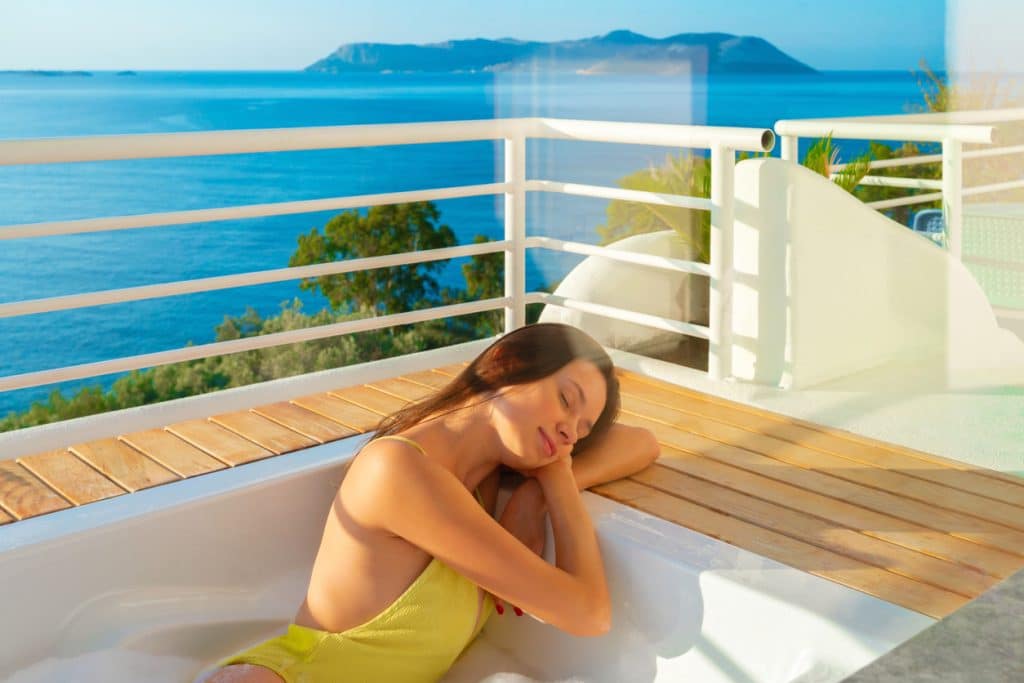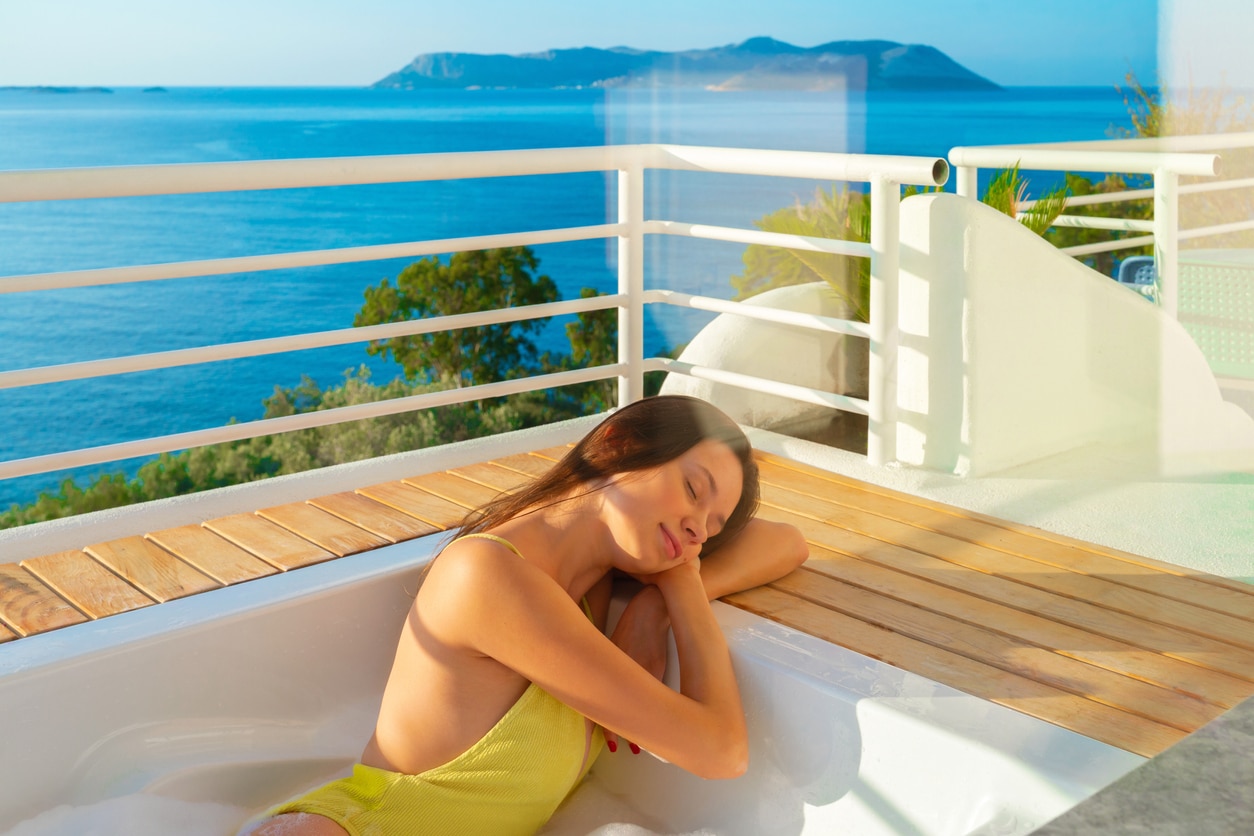Why does taking a hot tub (sometimes known by the brand name Jacuzzi) leave you feeling sleepy afterwards? The answer is more complicated than you might think!
Why does a hot tub make you tired?
When you settle into a hot tub, it is easy to become lulled by its bubbling warmth and feel relaxed and tired. But why does this happen? Why do you feel so drowsy after soaking in a hot tub? It turns out there are multiple reasons why a hot tub can make you sleepy.
Relaxation
One key reason why a hot tub can make you feel tired is due to relaxation. The heat and buoyancy of the water helps soothe away tension from your body and mind, which encourages your body to relax deeply. And as we all know, relaxation leads to sleepiness.
The hydrotherapy provided by a hot tub can be incredibly relaxing; even more so if you combine it with other forms of therapy such as aromatherapy or music therapy. Taking some time out of your day to actively relax can be incredibly rejuvenating but also leave you feeling sleepy afterwards – especially when combined with heat from the water itself. So if you find yourself feeling drowsy after spending some time in your hot tub, that’s completely normal!
Read also: Why does relaxation make you tired?

Muscle repair
One answer to the question why a hot tub makes you tired lies in the science behind how the heat of the spa water works on your body. When you submerge yourself in a hot tub, the heated water increases your body temperature, causing a shift in blood flow from your inner organs to your skin. This helps to relieve muscle tension, and encourages your muscles to repair themselves – something that requires energy which can leave you feeling tired.
Not only that, but the jets of warm water help loosen tight muscles further by massaging them and releasing any lactic acid buildup. As well as reducing muscle stiffness and pain, this massage helps boost circulation and remove toxins from the body – another process that requires energy and can make you feel sleepy.
The jets of a hot tub act similarly to how massage makes you tired.
Increased circulation
When you are in the hot tub your body temperature rises and your blood vessels expand to allow more blood circulation. This process increases the amount of oxygen and nutrients that reach your cells, which can improve your overall wellbeing. However, it also requires energy from your body – which will often result in tiredness afterwards.
Time of day
It’s not just the physical effects of a hot tub that promote sleepiness; the time of day can also have an influence on how tired you feel after soaking in one. If you use your hot tub at night, when your natural circadian rhythm is signaling for restful activity, it’s much easier for your body to drift into a deeper state of relaxation—and even sleep! Even if it’s during daylight hours, settling into a warm bath late in the afternoon when energy levels naturally tend to dip could still leave you feeling drowsy afterwards.
Heat
Heat itself can be quite tiring too; especially if the air temperature outside is cool while the water in the hot tub is warm-hot (around 38-40 degrees Celsius). As mentioned earlier, this temperature change will help increase blood flow and improve circulation throughout your entire body; however it also forces your cardiovascular system to work harder as it tries to maintain balance between internal and external temperatures. Over time this extra effort takes its toll on our energy reserves resulting in feelings of weariness or overwhelming exhaustion—often referred to as “hot tub fatigue”!
The warm water also creates an environment that is conducive to sleeping; something that many people find hard to resist. As you lay there in the water, feeling its warmth on your skin, it’s only natural that you start to feel drowsy and drift off into sleep.
Read also: Why does warm weather make you tired?
Dehydration
Dehydration can also contribute to feeling tired after a hot tub session – even though you might not notice it at all! When you’re in a hot tub your body sweats but you don’t notice as the water washes it away, meaning your body becomes increasingly dehydrated without your knowledge! As dehydration takes its toll on your body’s natural processes, it’s no surprise that fatigue starts to set in!
Chemicals
Hot tubs are often treated with chlorine, bromine, or a combination of the two. These chemicals help to keep the water clean and hygienic, but they can also be quite drying on your skin and eyes—something that will leave you feeling more tired than usual!
This is also one of the reasons why going to the pool makes you tired.
Does a hot tub help you sleep?
We all know that sleep is essential to living our best lives. But for many of us, getting enough quality sleep can be a challenge. This is why so many people are turning to hot tubs as a way to induce better sleep and get the rest they need. So does a hot tub really help you sleep? Let’s take a look at the science behind the claim that a hot tub can improve your slumber.
The first thing we must understand is how temperature affects our ability to sleep. Our bodies naturally lower our core temperature when we fall asleep, which helps us drift off into dreamland. That’s why it’s often recommended that your bedroom should be kept cool and dark in order to achieve better sleep quality. Studies show that if you spend some time in a warm environment before bed, such as soaking in a hot tub, it will raise your body temperature and make it easier for you to then cool down when you return to the bedroom and initiate the natural process of falling asleep. Simply put, hot-tubbing before bed can help set up ideal conditions for sounder snoozing.
In addition to helping regulate body temperature, regular use of a hot tub also has other benefits that can contribute to improved sleep quality.
Heat therapy is an ancient practice that has been used to treat numerous medical conditions as well as improve overall well-being. When combined with massage jets and other hydrotherapy techniques, soaking in a hot tub can bring about even greater physical and mental relaxation. The heat helps to relax tight muscles, loosen joint stiffness and increase circulation throughout the body – all of which contribute to improved comfort at bedtime. The massage jets also provide relief from aches and pains in your muscles and joints so you don’t have to lie awake thinking about them.
As well as physical benefits, soaking in a hot tub before bedtime can also help prepare your mind for sleep by reducing anxiety and calming any racing thoughts that may keep you awake at night.
Stress is one of the most common causes of insomnia; if you’re feeling anxious or overwhelmed at night, chances are you won’t be able to properly relax and shut down for sleep. By using a hot tub for 20-30 minutes prior to bedtime several times per week, you could experience lower levels of stress hormones like cortisol — leading to more restful nights on average. Just make sure not to overdo it; too much heat exposure close to bedtime could backfire and make it more difficult for you to fall asleep due to increased alertness from being too energized from the heat.
Conclusion: Why does a hot tub make you tired?
In conclusion, the answer to why a hot tub makes you tired lies in the combination of several factors. First and foremost is the warm water that can raise your body temperature and trigger a feeling of relaxation. This relaxation effect can result in an increase in endorphins, which may make you feel even more relaxed and sleepy. Additionally, the buoyancy of the water can reduce pressure on muscles and joints and cause an overall feeling of comfort. Finally, if you stay in the hot tub too long, your body may react to the heat by triggering a cooling response that will cause drowsiness. All these reasons combine to make it no surprise that a hot tub often leads to sleepiness.
